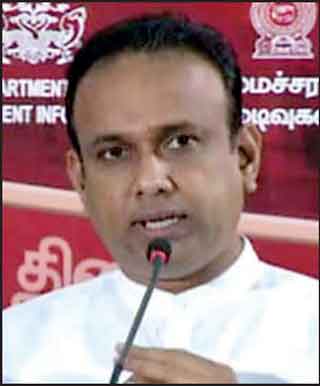Monday Feb 16, 2026
Monday Feb 16, 2026
Wednesday, 12 January 2022 00:00 - - {{hitsCtrl.values.hits}}
By Charumini de Silva
 |
| Cabinet Co-Spokesman Dr. Ramesh Pathirana
|
The Government is grappling hard to boost food supply amidst shortages and escalations in prices that have resulted from the temporary ban on fertiliser, the on-going foreign exchange crisis and spikes in global market and freight rates.
The Cabinet of Ministers at its meeting on Monday decided to import another 300,000 tons of rice from India, to counter the worsening food shortage, soaring prices and low yields.
The proposal to import 200,000 metric tons of Nadu and 100,000 tons of GR11 short grain rice – a substitute for Samba – submitted by Trade Minister Bandula Gunawardena, seeking to ensure the availability of the country’s staple food consignments in the open market, was approved by Cabinet.
Just last week, the Trade Ministry signed a government-to-government (G2G) agreement to import another 100,000 tons of rice from Myanmar.
“The decision to import rice was made after considering the high prices for locally produced rice as a result of the yield drop, due to unavailability of sufficient fertiliser,” Cabinet Co-Spokesman Dr. Ramesh Pathirana said at the post-Cabinet media briefing yesterday.
He said these rice stocks would be imported through State-run Sathosa and several private importers.
Sri Lanka’s annual rice consumption requirement is around 2.4 million tons. Meanwhile, the Trade Minister last week informed the Central Bank to release necessary foreign exchange so as to release 800 containers of rice held at the Colombo Port.
Since June 2021, Cabinet has approved the importation of rice on many occasions, while the Government has been forced to back out from imposing a Maximum Retail Price (MRP) on the country’s staple food, giving room for large-scale rice mill owners and traders to jack up prices at their convenience.
Following the removal of the MRP on rice, Finance Minister Basil Rajapaksa in early November reduced the special commodity levy of Rs. 65 per kg of imported rice to 25 cents, a move slated for six months starting 2 November and aimed at ensuring sufficient stocks ahead of the festive season.
However, the disgruntled farmers and consumers have claimed that the move had opened up the floodgates for large-scale rice importers to bring in as much stock they wished. “It is just all history repeating itself – like what happened with sugar,” they charged.
They claimed that the Government is liable for the food shortage created through the banning of fertiliser imports during a pandemic.
“The Government enforced a blanket ban on agricultural fertiliser with no scientific evidence or a vision in a pandemic situation, which brought the entire world to a standstill. The so-called visionary leaders and experts did not even revise their policies given the economic circumstances where all foreign inflows were halted, whilst the rest of the countries implemented alternative strategies. This administration created an era where the general public is being burdened endlessly in long queues for their [the Government’s] shortcomings and arrogance.”
As per the Cabinet Co-Spokesman, the Government had lost foreign inflows of over $ 14 billion, whilst total debts had soared to $ 42 billion over the past two years.
However, he justified the current economic conditions faced, noting that even developed countries like the US were suffering, whilst expressing confidence that Sri Lanka’s economy would bounce back with the gradual resumption of tourism, exports and workers’ remittances.
“No Government likes to be criticised, or to bring an era with long queues for essential commodities, or to see the food prices skyrocketing. But given the foreign exchange crisis, loss of revenue from tourism and workers’ remittances, the economic situation was adversely impacted. We are hopeful that the status of the economy will turn favourably over the next few months,” he said.
